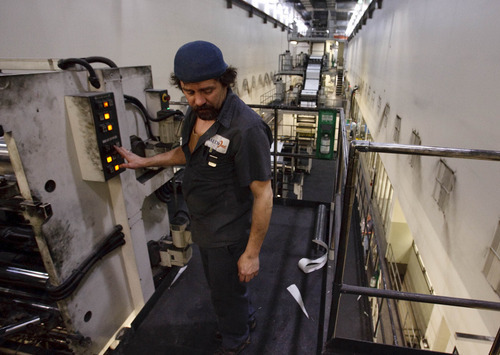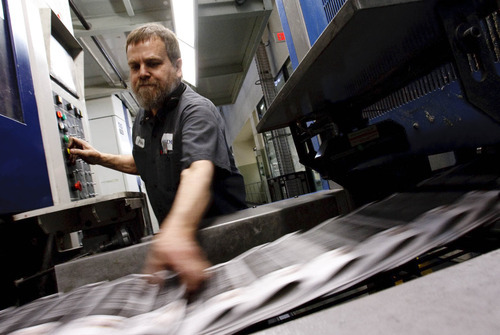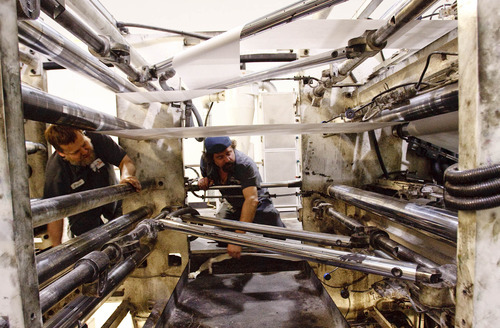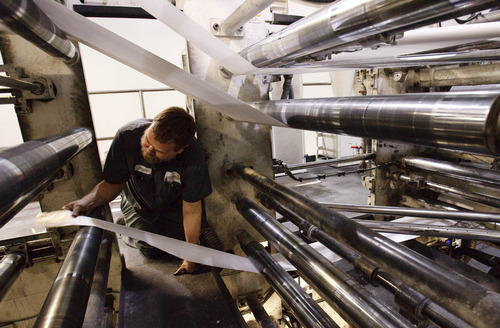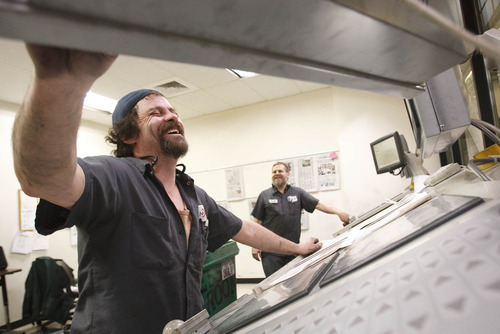This is an archived article that was published on sltrib.com in 2011, and information in the article may be outdated. It is provided only for personal research purposes and may not be reprinted.
Little more than a year ago, Dean Singleton, The Salt Lake Tribune's publisher and CEO of parent company MediaNews Group, roughed out his expectation for the future of newspapers, including his own.
Banks, Singleton predicted to editorial writers gathered in Salt Lake City, would become the reluctant owners of numerous media companies, forced by the recession to file for reorganization when advertising revenue collapsed and paying debts became difficult.
Four months later, Media-News filed a prepackaged reorganization, joining several other newspaper chains that took the same step, going back to 2008. And as these media companies work through their problems, some with the approval of their creditors (as was the case with MediaNews), one name keeps cropping up — Alden Global Capital.
—
Quiet partner • The newspaper industry knows little about the inner workings of Alden, a hedge fund that has been quietly making investments in distressed media companies for three years, while its representatives repeatedly ignore requests for interviews. They did not respond to several requests for comments for this story.
Alden's buying spree is certain to have important implications for newspapers. Today, the fund is said to own a substantial part of MediaNews, whose holdings consist of 61 daily papers and about 100 nondailies. By the latter gauge, MediaNews is the No. 2 newspaper chain in the U.S. The remainder of the Denver-based chain is owned by a consortium of lenders and by Singleton himself.
Alden probably owns a similar percentage in Freedom Communications, the Irvine, Calif.-based newspaper and television chain, said Ken Doctor, a news industry analyst and author of Newsonomics: Twelve New Trends That Will Shape the News You Get.
Alden also has bought into the Tribune Co., the Philadelphia Media Network and the Journal Register Co., with stakes ranging from 10 percent to more than 20 percent, Doctor said.
The fund owns smaller pieces of USA Today publisher Gannett Co. and Lee Enterprises (which publishes Provo's Daily Herald), both of which have been struggling with plunging revenue but have avoided bankruptcy, he said.
In Canada, Postmedia Network bought the newspaper holdings of Canwest Global Communications with Alden's help.
"I think it's a financial play," Doctor said. "If they are acquiring stakes in a number of companies, the question is, what is going to happen to the [newspaper] industry, rather than what is going to happen to the companies?
"They are aware of that distinction and they believe a substantial part of that industry can turn around," he said, although not everyone buys that reasoning.
In one respect, hedge funds are like mutual funds. Both are made up of pools of money that people want to invest. The similarities end there, though. Mutual funds are regulated by the Securities and Exchange Commission; hedge funds are not.
Anyone can invest in a mutual fund. Hedge funds are open only to accredited investors, an SEC term applied to high net-worth people cleared to put money into riskier investments that mutual funds would avoid. But when the investments pay off, the returns can be huge.
Hedge funds have other peculiarities. Minimum investments typically are $1 million. And investors usually must stay at least a year with a hedge fund before pulling out.
Alden requires at least $2 million from new investors, according to Hedgeweb.net. The online hedge fund database says Alden's Global Distressed Opportunities Fund has $2.3 billion in assets under management.
Alden established the fund in 2008. In its first year ending September 2009, the fund returned 220 percent to investors, which earned it a first place in the distressed securities category of an awards event presented by AR Magazine, which tracks the hedge fund industry.
"None of the contenders came even close to the triple-digit return of Alden Global Distressed Opportunities," the magazine said.
—
Fund focus • Media companies and financial institutions are principal priorities of the fund, according to a message Alden sent shareholders in April.
"Among other reasons, financials are experiencing distress as a result of the credit crisis, and media companies are experiencing distress as a result of the significant slowdown in advertising in 2009. In both cases, we think that the analyst community is underestimating each industry's emergence from distress and this out-of-consensus view provides support for our investment thesis," the message said.
That statement doesn't impress long-time media analyst John Morton, who thinks Alden's strategy will fail. Advertising revenue began to decline long before the recession started, he said. So to recoup their investment, fund managers will exert pressure on media companies to cut costs, which won't be easy because most papers have already made deep cuts to their editorial staffs in order to survive.
"They think everybody is wrong about the perceptions of the newspaper business, that indeed the multiples of operating cash flow will surge, and in four or five years they will be able to sell and make a profit, Morton said. "Good luck."
Newspapers are acquired on the basis of multiples of the money moving through a company as a result of its operations. In the heyday of newspapers, multiples could be 12 to 14, and sometimes higher, Morton said. Today, multiples are down to around 5, with little prospect of going much higher, he said.
—
The future • Doctor, the Newsonomics author, sees more in Alden's strategy. He says Singleton, who is stepping down as CEO to become executive chairman of MediaNews, has been a leader in "clustering," or acquiring multiple media properties in a region and then consolidating many of the editorial and business tasks necessary to run them.
"What Alden can do is push [its holdings] to the next level of consolidation and clustering," Doctor said.
Newspapers have been slow to develop digital strategies for disseminating information and advertising to readers. Alden will try to speed that up because digital advertising is the fastest-growing kind of advertising in the U.S. and will probably pass print and broadcast within two years, Doctor said.
"Many buying decisions are local. How do you get those local dollars that are spent to reach consumers through digital media? If you are Alden, you try to create more and more mobile couponing opportunities" through smart phones, tablets, social media and e-mail, Doctor said.
"There are many digital opportunities out there. We take our brands [such as The Salt Lake Tribune] and say these brands have a lot of value, and we make them centerpieces again of local commerce. That's where we make our money," he said.
In its announcement of Singleton's plan to separate the duties of CEO and chairman earlier this month, MediaNews acknowledged the company was entering a new stage of development.
Among other things, the restructuring of MediaNews' board of directors and top management is meant to "continue the transformation of the business from a print-oriented newspaper company to a locally focused provider of news and information across multiple platforms," the company said.


